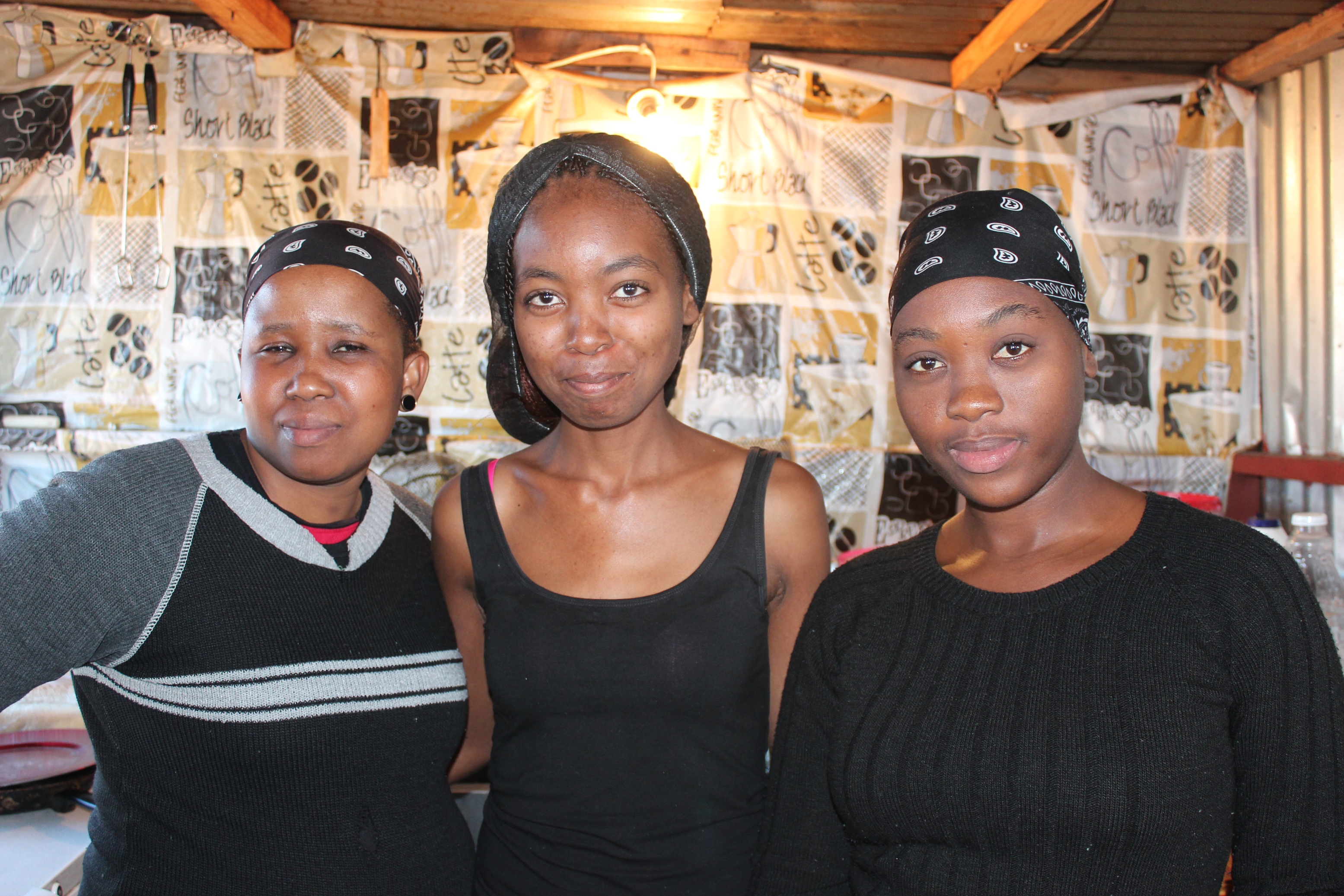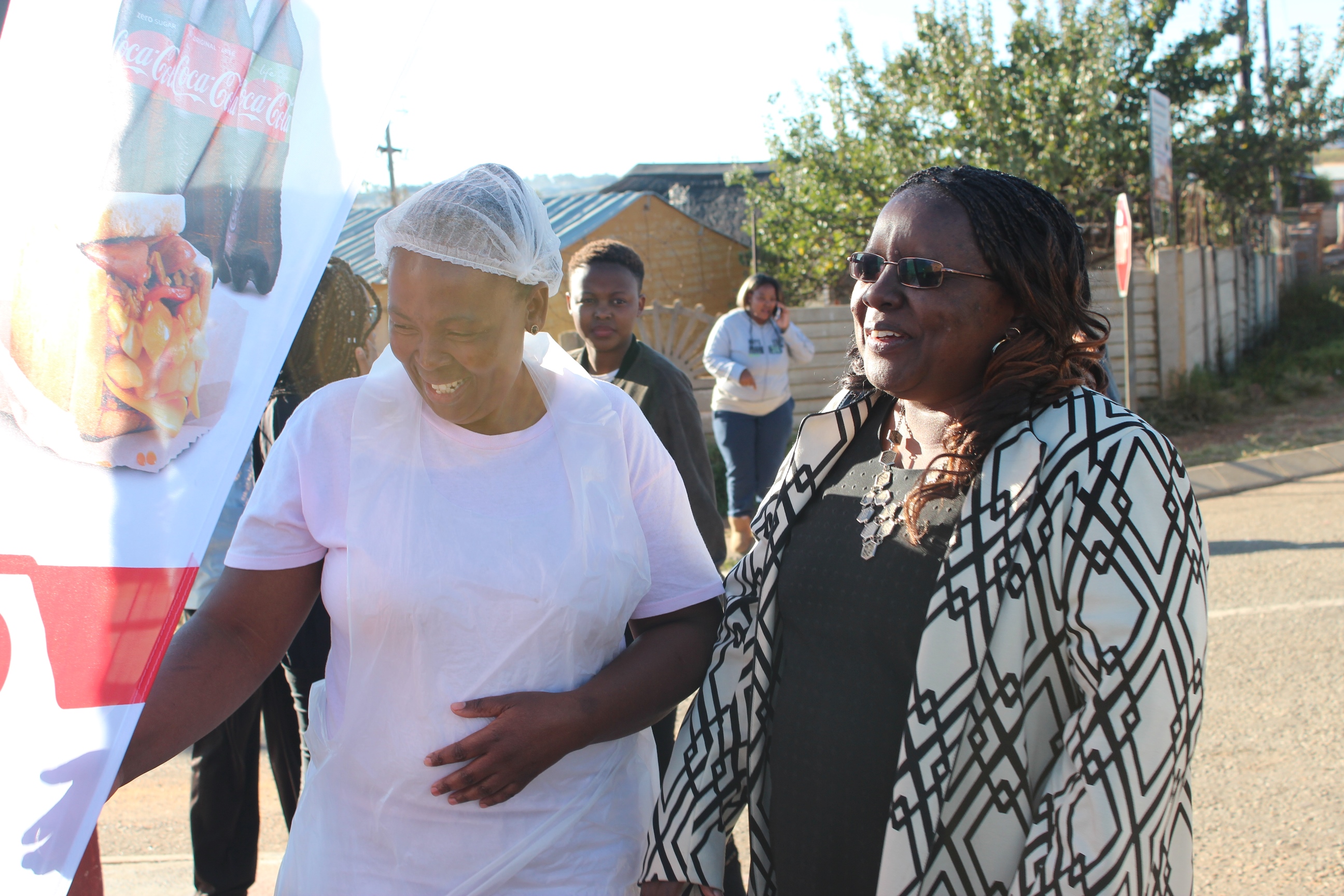Township entrepreneurs prove that investing in women-owned businesses makes economic sense
Following the Empowerment of Women Entrepreneurs Programme run by UN Women SAMCO from 2014 – 2016, 40 women entrepreneurs were selected to receive further training in a three-day training workshop held in Johannesburg in December 2016. The entrepreneurs were trained using the International Labour Organization’s enterprise development training materials which had advanced content and cover topics such as People and Productivity. In May 2017, members of the UN Women SAMCO office made a follow up visit to two of the entrepreneurs based in Kagiso, a township outside of Krugersdorp in South Africa.Date:
It’s difficult to miss Jay-Beez Fast Food on Jane Muso Street in Kagiso. The green lawn, multi-coloured chairs and tables and the distinct smell of frying magwinya (local doughnuts) draw you in. Inside owner Gape Bogopane, her husband Jabu and her assistant Lady are busy taking orders from hungry customers, many of whom reside across the road in a mining hostel.
Jay Beez did not always have this buzz or this look. Following her training Gape focused on improving her marketing to expand her customer base. “We had to be able to attract people with what we had. There was no lawn or paving, we put it there. ”
Gape says the knowledge she gained from the training on People and Productivity has helped her to recruit the right staff and create a relationship that enables her to get the best value from her employees. “Ask Lady, she had to send in a CV before getting hired.” Lady has been working with her for over a year, and she has two other part-time assistants.
Beyond her staff, Gape deliberately seeks to empower others with the knowledge she gained from the EWEP training. She is continually mentoring other business people and has helped form a business network where they share ideas through a WhatsApp group and meetings. “We have a business partners group chat around Kagiso. One member I mentored even won the Township Entrepreneurship Award,” Gape says proudly.

Another key lesson that Gape has put into practice is using the money she earns to grow her business. She saved her profits and bought a fridge, a bread flour mixer and an oven. With the bread mixer and oven, she begun baking the bread that she used for kotas (local sandwich) and sold the surplus. “I have never gotten paid; I believe in reinvesting. The only pay I get is the school fees I take for my child.”
For Gape, one of the key benefits of the EWEP programme was learning to negotiate favourable business deals. After adding a bakery business she was soon faced with strict space requirements by the national power utility for electricity consumed. To navigate this challenge she partnered with a fellow entrepreneur who already had a bakery to offset the space requirement. Baking helped Gape to attract new customers and increase returns.
From her savings, Gape is now opening a second shop ten minutes away in Krugersdorp that caters for city dwellers who want township food. “We’re taking the township to the city. “It’s going to be a café we’ll be selling coffee, tea, doughnuts, cupcakes. I’ve already bought equipment and had to get tables and chairs; the renovation cost us.” Gape’s excitement at the expansion of her businesses is evident, “We’re going to have a proper logo and uniforms. We have to make sure that the place looks attractive for town. I see more revenue, I see us being able to do more.”
Less than a kilometre from Jay Beez, Tshepang Chauke is getting chips ready for the lunchtime rush. Her fast food outlet, Kota sits in what used to be a garage.
Though her business is doing well. Tshepang is grappling with the growing competition. “Business is fine but challenging because people are opening similar businesses,” she says counting seven women in the vicinity who have the same product offering including one directly opposite her.
When the most recent shop opened, she was forced to reduce the price of chips from R15 to R10 to retain her loyal customers but also bring on new ones. “What I’ve learnt is that you must not be angry when customers move; even if I see them at another shop, I greet them with a smile. Rather make nice food so that your customers come back. I do my best. I have to put more chips to make them come back.” She is also currently negotiating with a group of mini-bus taxi drivers to offer them monthly meals which will differentiate Kota from similar businesses. “I approached the taxi drivers; they want to pay monthly or weekly though because that is how they are paid so I’m still discussing with them how it would work.”

The training she received in record keeping and stock management has also paid off she says. Since the last training she has kept her records well separating her costs from that of the business. “I don’t pay myself a salary but if I do take any money for personal use, I record it.” She has paid for her 20-year old daughter to complete a flight attendant course and her daughter is now working several part time jobs including helping Tshepang in the shop as she waits to be placed. Tshepang also employs a full time assistant and a part timer who helps her on Sundays so that she can take time off before the week starts again.
She also negotiated with a local butcher to give her a reduced price so that she could keep her prices low. “I went to the manager and told him I was buying the meat to sell not to eat and I asked for a discount. He said ‘no problem, how much do you need a week?’ and he was able to give me credit.”
Yet having neighbours in the same business has its positive aspects when it comes to managing stock. One of her fellow entrepreneurs helps her out with buying stock. “If she’s going to buy stock, then she’ll ask me ‘do you have enough of this product because I’m going’ and when I’m going I also help her.”
The journey of an entrepreneur entails overcoming many obstacles yet these women have faced their challenges with courage and determination, already growing their businesses and investing in their personal development through networking with other entrepreneurs. UN Women SAMCO seeks to continue partnering with the private sector and government to reach more women entrepreneurs.